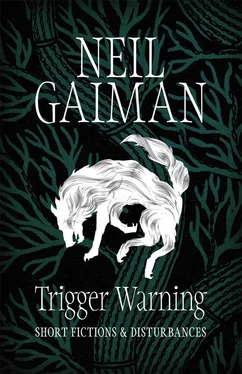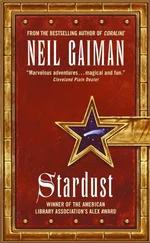Neil Gaiman - Trigger Warning - Short Fictions and Disturbances
Здесь есть возможность читать онлайн «Neil Gaiman - Trigger Warning - Short Fictions and Disturbances» весь текст электронной книги совершенно бесплатно (целиком полную версию без сокращений). В некоторых случаях можно слушать аудио, скачать через торрент в формате fb2 и присутствует краткое содержание. Год выпуска: 2015, Издательство: Headline, Жанр: Старинная литература, на английском языке. Описание произведения, (предисловие) а так же отзывы посетителей доступны на портале библиотеки ЛибКат.
- Название:Trigger Warning: Short Fictions and Disturbances
- Автор:
- Издательство:Headline
- Жанр:
- Год:2015
- ISBN:нет данных
- Рейтинг книги:4 / 5. Голосов: 1
-
Избранное:Добавить в избранное
- Отзывы:
-
Ваша оценка:
- 80
- 1
- 2
- 3
- 4
- 5
Trigger Warning: Short Fictions and Disturbances: краткое содержание, описание и аннотация
Предлагаем к чтению аннотацию, описание, краткое содержание или предисловие (зависит от того, что написал сам автор книги «Trigger Warning: Short Fictions and Disturbances»). Если вы не нашли необходимую информацию о книге — напишите в комментариях, мы постараемся отыскать её.
Trigger Warning: Short Fictions and Disturbances — читать онлайн бесплатно полную книгу (весь текст) целиком
Ниже представлен текст книги, разбитый по страницам. Система сохранения места последней прочитанной страницы, позволяет с удобством читать онлайн бесплатно книгу «Trigger Warning: Short Fictions and Disturbances», без необходимости каждый раз заново искать на чём Вы остановились. Поставьте закладку, и сможете в любой момент перейти на страницу, на которой закончили чтение.
Интервал:
Закладка:
I shall buy theatrical makeup, disguise myself as an old man, so as not to startle him, and I shall invite my old friend over for tea.
There will be honey on buttered toast served with the tea that afternoon, I fancy.
***
There were tales of a barbarian who passed through the village on his way east, but the people who told Old Gao this did not believe that it could have been the same man who had lived in Gao’s shack. This one was young and proud, and his hair was dark. It was not the old man who had walked through those parts in the spring, although, one person told Gao, the bag was similar.
Old Gao walked up the mountainside to investigate, although he suspected what he would find before he got there.
The stranger was gone, and the stranger’s bag.
There had been much burning, though. That was clear. Papers had been burnt – Old Gao recognised the edge of a drawing the stranger had made of one of his bees, but the rest of the papers were ash, or blackened beyond recognition, even had Old Gao been able to read barbarian writing. The papers were not the only things to have been burnt; parts of the hive that stranger had rented were now only twisted ash; there were blackened, twisted strips of tin that might once have contained brightly coloured syrups.
The colour was added to the syrups, the stranger had told him once, so that he could tell them apart, although for what purpose Old Gao had never inquired.
He examined the shack like a detective, searching for a clue as to the stranger’s nature or his whereabouts. On the ceramic pillow four silver coins had been left for him to find – two yuan coins and two silver pesos – and he put them away.
Behind the shack he found a heap of used slurry, with the last bees of the day still crawling upon it, tasting whatever sweetness was still on the surface of the still-sticky wax.
Old Gao thought long and hard before he gathered up the slurry, wrapped it loosely in cloth, and put it in a pot, which he filled with water. He heated the water on the brazier, but did not let it boil. Soon enough the wax floated to the surface, leaving the dead bees and the dirt and the pollen and the propolis inside the cloth.
He let it cool.
Then he walked outside, and he stared up at the moon. It was almost full.
He wondered how many villagers knew that his son had died as a baby. He remembered his wife, but her face was distant, and he had no portraits or photographs of her. He thought that there was nothing he was so suited for on the face of the earth as to keep the black, bullet-like bees on the side of this high, high hill. There was no other man who knew their temperament as he did.
The water had cooled. He lifted the now solid block of beeswax out of the water, placed it on the boards of the bed to finish cooling. Then he took the cloth filled with dirt and impurities out of the pot. And then, because he too was, in his way, a detective, and once you have eliminated the impossible whatever remains, however unlikely, must be the truth, he drank the sweet water in the pot. There is a lot of honey in slurry, after all, even after the majority of it has dripped through a cloth and been purified. The water tasted of honey, but not a honey that Gao had ever tasted before. It tasted of smoke, and metal, and strange flowers, and odd perfumes. It tasted, Gao thought, a little like sex.
He drank it all down, and then he slept, with his head on the ceramic pillow.
When he woke, he thought, he would decide how to deal with his cousin, who would expect to inherit the twelve hives on the hill when Old Gao went missing.
He would be an illegitimate son, perhaps, the young man who would return in the days to come. Or perhaps a son. Young Gao. Who would remember, now? It did not matter.
He would go to the city and then he would return, and he would keep the black bees on the side of the mountain for as long as days and circumstances would allow.
The Man Who Forgot Ray Bradbury
I am forgetting things, which scares me.
I am losing words, although I am not losing concepts. I hope that I am not losing concepts. If I am losing concepts, I am not aware of it. If I am losing concepts, how would I know?
Which is funny, because my memory was always so good. Everything was in there. Sometimes my memory was so good that I even thought that I could remember things I didn’t know yet. Remembering forward . . .
I don’t think there’s a word for that, is there? Remembering things that haven’t happened yet. I don’t have that feeling I get when I go looking in my head for a word that isn’t there, as if someone must have come and taken it in the night.
When I was a young man I lived in a big, shared house. I was a student, then. We had our own shelves in the kitchen, neatly marked with our names, and our own shelves in the fridge, upon which we kept our own eggs, cheese, yogurt, milk. I was always punctilious about using only my own provisions. Others were not so . . . there. I lost a word. One that would mean, ‘careful to obey the rules’. The other people in the house were . . . not so. I would go to the fridge, but my eggs would have vanished.
I am thinking of a sky filled with spaceships, so many of them that they seem like a plague of locusts, silver against the luminous mauve of the night.
Things would go missing from my room back then as well. Boots. I remember my boots going. Or ‘being gone’, I should say, as I did not ever actually catch them in the act of leaving. Boots do not just ‘go’. Somebody ‘went’ them. Just like my big dictionary. Same house, same time period. I went to the small bookshelf beside my bed (everything was by my bed: it was my room, but it was not much larger than a cupboard with a bed in it). I went to the shelf and the dictionary was gone, just a dictionary-sized hole in my shelf to show where my dictionary wasn’t.
All the words and the book they came in were gone. Over the next month they also took my radio, a can of shaving foam, a pad of notepaper and a box of pencils. And my yogurt. And, I discovered during a power cut, my candles.
Now I am thinking of a boy with new tennis shoes, who believes he can run forever. No, that is not giving it to me. A dry town in which it rained forever. A road through the desert, on which good people see a mirage. A dinosaur that is a movie producer. The mirage was the pleasure dome of Kublai Khan. No . . .
Sometimes when the words go away I can find them by creeping up on them from another direction. Say I go and look for a word – I am discussing the inhabitants of the planet Mars, say, and I realise that the word for them has gone. I might also realise that the missing word occurs in a sentence or a title. The ________ Chronicles. My Favourite _________. If that does not give it to me I circle the idea. Little green men, I think, or tall, dark-skinned, gentle: dark they were and golden-eyed . . . and suddenly the word Martians is waiting for me, like a friend or a lover at the end of a long day.
I left that house when my radio went. It was too wearing, the slow disappearance of the things I had thought so safely mine, item by item, thing by thing, object by object, word by word.
When I was twelve I was told a story by an old man that I have never forgotten.
A poor man found himself in a forest as night fell, and he had no prayer book to say his evening prayers. So he said, ‘God who knows all things, I have no prayer book and I do not know any prayers by heart. But you know all the prayers. You are God. So this is what I am going to do. I am going to say the alphabet, and I will let you put the words together.’
There are things missing from my mind, and it scares me.
Icarus! It’s not as if I have forgotten all names. I remember Icarus. He flew too close to the sun. In the stories, though, it’s worth it. Always worth it to have tried, even if you fail, even if you fall like a meteor forever. Better to have flamed in the darkness, to have inspired others, to have lived, than to have sat in the darkness, cursing the people who borrowed, but did not return, your candle.
Читать дальшеИнтервал:
Закладка:
Похожие книги на «Trigger Warning: Short Fictions and Disturbances»
Представляем Вашему вниманию похожие книги на «Trigger Warning: Short Fictions and Disturbances» списком для выбора. Мы отобрали схожую по названию и смыслу литературу в надежде предоставить читателям больше вариантов отыскать новые, интересные, ещё непрочитанные произведения.
Обсуждение, отзывы о книге «Trigger Warning: Short Fictions and Disturbances» и просто собственные мнения читателей. Оставьте ваши комментарии, напишите, что Вы думаете о произведении, его смысле или главных героях. Укажите что конкретно понравилось, а что нет, и почему Вы так считаете.







